The UK economy experienced a surprising uptick in growth during the final quarter of 2024 despite earlier concerns of a looming recession. Official figures released by the Office for National Statistics (ONS) revealed a modest 0.1% increase in gross domestic product (GDP) for the fourth quarter. This unexpected growth provided a glimmer of hope for economic recovery, particularly in the services and manufacturing sectors, which saw a resurgence in December.
Economists had previously anticipated a contraction of 0.1% for the three-month period due to stagnant growth in the preceding months. The fragile balance between growth and contraction in the data raised concerns about the possibility of a shallow recession, underscoring the volatility of the economic landscape. While the latest figures indicated a marginal improvement, the overall economic outlook remained uncertain.
Implications for Living Standards
Despite the positive GDP growth, living standards in the UK continued to face challenges. GDP per capita, a key indicator of living standards, declined for the second consecutive quarter. This downward trend underscored the ongoing economic pressures faced by the population, highlighting the need for sustainable growth strategies to improve overall well-being.
The government, led by Prime Minister Sir Keir Starmer, faced mounting pressure to address the economic challenges and restore public confidence. A series of budgetary measures introduced in October aimed to alleviate financial burdens on working individuals but drew criticism from businesses for potential adverse effects. The upcoming increase in National Insurance contributions and rising inflation rates further compounded existing concerns about the economic outlook.
Bank Projections and Policy Responses
The Bank of England’s recent projections painted a bleak picture of the economic landscape, with inflation expected to reach 3.7% in the coming year. Growth forecasts for 2025 were revised downward to 0.75%, significantly lower than previous estimates. These projections posed a significant challenge for Chancellor Rachel Reeves, who faced mounting pressure to navigate the economic downturn while upholding budgetary constraints.
In response to the economic challenges, Reeves emphasized the government’s commitment to revitalizing the economy and improving living standards for working people. The implementation of a comprehensive Plan for Change aimed to stimulate economic growth, bolster infrastructure investments, and support business expansion. However, opposition figures, such as Shadow Chancellor Mel Stride, criticized the government’s budgetary policies, citing detrimental effects on growth and employment.
As the UK grappled with both domestic and global economic uncertainties, the need for coordinated policy responses and strategic interventions became increasingly apparent. The delicate balance between economic growth, fiscal stability, and social well-being underscored the complexities of navigating an evolving economic landscape. The coming months would prove critical in determining the efficacy of government initiatives and the resilience of the UK economy in the face of mounting challenges.













